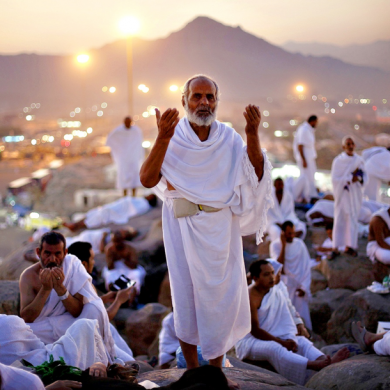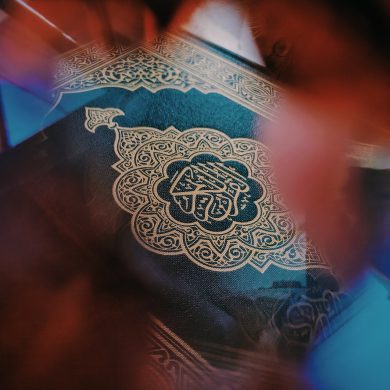Some were young, some were old. Some were free, others were slaves. Some were from other sects or religions. But one thing connected them – their bravery and defence of the truth.
Contents:
- Introduction
- Overview of Lessons
- The women:
- Fatima al-zahra’
- Zainab al-kubrā
- Um Ayman
- Um al-banīn
- Um kulthūm (Zainab al-ṣughrā)
- ‘Um salama
- Sakina bint al-Hussein
- Ruqayya bint al-Hussein
- Fatima bint al-Hussein
- ‘Um wahab al-ansāriyya
- Taw’a
- The mother of ‘amru bin janāda al-ansāri
- Dulhum bintʿamr
- Fiḍḍa
Introduction
When we read the history of the events of Karbala we find that the courageous and pious men that stood alongside Imam al-Hussein (as) are the dominant figures. However, if we take a closer look, we will find that women equally played a central role in Karbala. The two main characters, who provided unique intellectual and ethical guidance to the ʾumma are Imam al-Hussein and Zainab al-kubrā; a male and a female! This points out the vital role of both males and females in Karbala, as they complemented one another. In an Islamic society, everyone is expected to take responsibility and has a role to play. It is important to note that the circle of women in Karbala is not limited to those who had direct roles in this event, some had an indirect but vital role.
For brevity, this article does not present an exhaustive list of all the women of Karbala. There are more, including the wife of Imam Hussain (al-rabab), the wife of Imam Hassan (um farwa) and four daughters of Imam Ali, namely ruqayya, safiyya,ʾum hani, and sakina. The following does not intend to provide a historical account of thier lives but rather, the intent is to shine a light on their personalities and provide a source of inspiration for us to follow their footsteps.
Overview of Lessons
- Many women witnessed Karbala and played an important role there. Yet unfortunately, historians mention only a few of them.
- The few women that are mentioned in the historical books are always associated with the context of sadness, grief and weakness. The only exception to this might be the status of Zainab al-kubrā, as many historians narrate her brave stance in kūfa and Damascus and her powerful speeches. However, her overall image in history is still associated predominantly with sorrow and pain.
- The reality is that women in Karbala existed in the battlefield. They treated wounded soldiers, encouraged people to challenge the enemy, and provided every possible support to the brave believers in the Imam’s group.
- These women were strong, patient, and had a great level of perseverance.
- These heroines spoke out to convey the reform message to many Muslims, which hindered the plans of the enemy.
- These women also managed difficult situations while maintaining Islamic values.
- They changed the weak situation of captivity to a strong situation of freedom and resistance.
- They enhanced the emotional aspect of the revolution, which made the event of Karbala an eternal historical issue in the battle between good and evil.
- They teach us that having a sense of responsibility towards the message of Islam is vital regardless of gender or age.
- In order to recognise the great role of these women and to avoid undermining their efforts, it is essential to analyse historical narratives in more depth and to not underestimate any person who contributed to this revolution.
- Those women excelled in their role. We all need to follow their steps and make great contributions to the world which would be remembered in this life and the hereafter.
The Heroines
1. Fatima al-zahra‘
Since both heroes of Karbala, Imam Hussein, and sayyida Zainab were the children of Fatima and Ali, it is unquestionable they had their characteristics. These include strong faith, patience, purity, sincere worship, high ethics, responsibility, bravery, and standing up against oppression. This highlights the great role and big responsibility of the parents in upbringing children. The unique combination of Imam Ali and Fatima brought to the world these outstanding characters. Among the many lessons to be learnt from Fatima are:
- Children usually take after their parents and so if parents want righteous children, they must continuously develop themselves and their Iman to set an strong example.
- If you are faithful, strong, pure, responsible, patient and brave, there is a big chance that your children will have these morals too
- If you stand by ḥaq (truth), your children will follow your steps
- It is vital to search for knowledgeable and keep learning all your life
- Sharing the responsibilities at home and respecting everyone are important to a successful family life
2. Zainab al-kubrā
Zainab al-kubrā is a unique character that presents a great example of a Muslim woman who can successfully manage extreme hardships in life. Like her mother, Fatima, she was very well educated, intellectual, and had strong opinions. Her mind was full of knowledge, her heart was full of sincerity to Allah (swt), and her life was a battleground defending the truth. Indeed women, such as Fatima and Zainab, are role models to men and women alike.
Zainab al-kubrā left her husband in Medina and joined Imam Hussein’s caravan with her two sons, sacrificing her personal comfort for Islam. She accompanied Imam Hussein throughout his battle against corruption, and she was always discussing the issues of society with him. After the martyrdom of Imam Hussein, Zainab took the responsibility of completing the noble task of reforming the society. She was strong and didn’t cry publicly after the tragedy because she was proud of the martyrs and didn’t want to show her weakness to the enemies. It is narrated that the only time she cried was on the night ofʿashūraʾ when she realised that everyone is going to be martyred the next day. Also, she did not hit her forehead as some narrations suggest, she remained steadfast and patient towards this noble cause. She took care of the kids and their mothers and supervised the treatment of Imam al-sajjād.
She was among the captives who were taken to kūfa where she showed great strength and delivered a powerful speech in front of ibn ziyād, the wāli of kūfa at that time. In Damascus, despite her old age and the unbearable hardship she experienced during the long trip, she exhibited extreme strength and stood up in front of yazīd delivering phenomenal speeches. Her speeches maintained the goals of Imam Hussein’s revolution. In life, people may face problems that are imposed on them due to circumstances that are out of their control, such as sickness, poverty, hardship, and death. With her great tolerance and Iman, Zainab taught us that even if we do not have the capacity to change hard situations because they are out of our control, we can still manage our internal reactions and feelings since we have full control on our hearts and minds. So, what do we learn from Zainab al-kubrā?
- Knowledge, sincerity to Allah and responsibility are the keys to a strong personality
- If you are on the true path, do not be afraid to speak out in front of tyrants
- Women can have a role in social, economic and political affairs. They have the capacity to bare great tasks, and they can work side by side with all other members of the society to maintain goodness in this world
- When she said “I have seen nothing but beauty”, she taught us that the concept of ‘beauty’ is not fixed, it is rather relative to how you interpret it. So, real beauty is the beauty of being truthful and faithful. In other words; inner beauty is more important than the deceptive outside appearance of things
- Patience (ṣabr) does not mean defeat or deterioration. It is rather a powerful movement to challenge weakness in our personalities, and a remedy that gives us strength to challenge difficult situations; that is why she did not show any weakness during calamities.
- We must trust that nothing would affect us unless Allah wants it to happen. If Allah wants something to happen to us, it means that it holds benefits for us. So, nothing would affect us unless it holds benefits for us.
- Family responsibilities should not prevent women from participating in society’s matters, provided this participation is consistent with her abilities. Likewise, fatherhood responsibilities do not usually prevent men from contributing in society.
- Femininity should not always be associated with weakness.
3.ʾUm Ayman
‘Um Ayman is one of the wives of Prophet Muhammed (saw). Although she did not witness the battle of Karbala, she contributed indirectly by helping to raise the hero of Karbala; Imam Hussein. When Fatima gave birth to Imam Hussein; ‘um Ayman took the baby to the Prophet, who said “welcome to the baby and his carrier”, praising her as the one who will help raise the baby. So, what do we learn fromʾum Ayman?
- Being in a blessed position such as a wife of a prophet is great, yet it is one’s own hard work and contribution which makes them a good person.
- Faithful and kind people care about all the children in their family and in this world, regardless of their relationships
4. ‘Um al-banīn
‘Um al-banīn was a noble woman from a noble family. Her name is Fatima bint hizām al-kilābiyya. She was married to Imam Ali after Fatima al-zahraʾ passed away. She was the best stepmother to the four orphans of Fatima; Hassan, Hussein, Zainab and ‘um kulthūm. She loved them deeply and treated them like her own, caring for them more than her own children. She had four sons who were all martyred in Karbala. However, she was most devastated when she heard that Imam Hussein was martyred, because she believed he was the Imam of that time and that losing him means losing the leader of Islam. So what do we learn from ‘um al-banīn?
- Be kind to orphans and treat them well
- Love, kindness, sincerity, respect and good manners should dominate the family life
- It is important to have a strong faith, be a conscious Muslim and know your Imam
- Islam is above everything; she sacrificed four sons in Karbala
- Be brave and support truth even in difficult circumstances
5. ‘Um kulthūm (Zainab al-ṣughrā)
‘Um kulthūm was the fourth daughter of Fatima and Imam Ali. She was knowledgeable, eloquent, and a good speaker. She witnessed Karbala and was among the captives. Although she had a painful time in Karbala, she kept delivering speeches all the way to Damascus. These speeches helped people to learn about the virtues ofʾahlul-bayt, and they helped to unveil the disbelief and oppression nature of theʾumayyad rulers.
In Damascus, she kept talking to shāmi people[1], explaining the virtues ofʾahlul-bayt. In Medina she continued delivering speeches to outline the circumstances of Karbala. Although her speeches in kūfa and Damascus were powerful like the speeches of Zainab al-kubrā, unfortunately history does not recognise her role in Karbala.ʾUm kulthūm wrote a famous poem that is usually narrated by many reciters, yet unfortunately no one acknowledges that she has written it[2]. Since she scarified a lot and defended the truth, she absolutely deserves to be acknowledged. So, what do we learn fromʾum kulthūm?
- Take responsibility and do not depend on others
- Be strong and do not give up in hard situations, as long as you are close to Allah and on the side of truth
- Keep learning and be knowledgeable so you can deal with difficulties in the right way
- To continuously defend truth and truthful people and challenge evil people and evil ideas
6. ‘Um salama
‘Um salama is one of Prophet Muhammed’s wives. Her name is Hind bint abu’umayya al-makhz’ūmi. She was born 10 years before the bi’tha (revelation). Her father was wise and intelligent and she inherited these qualities from him. In the famous historical story of renovating the ka’ba five years before the bi’tha, her father was the one who suggested to consult the first man who enters al-Masjid al-Haram, and that man was Prophet Muhammed. Everyone was happy to let al-sādiq al-‘amīn manage the situation; the Prophet suggested that all tribes could participate in putting the black stone by letting a man from every tribe lift the stone together on a big sheet and handing it to him to put it in its final place.
When Islam arose, ‘um salama was one of the first people who believed in Islam. She immigrated to ḥabasha (Abyssinia), and after returning from ḥabasha she immigrated to Medina. Her husband ‘abu salama was wounded in the battle of ‘uḥud and was martyred shortly after. The Prophet married her before the battle of ‘aḥzāb in the fifth year after hijra and was among the best wives to the Prophet after Khadija. She was also one of the narrators of the Prophet’s hadith and was brave enough to defend the truth. She wrote a letter to mu’āwiya condemning his cursing of Imam Ali. This showed her love of ‘ahlul-bayt and opposition to mu’āwiya
She was honest and trustworthy. When Imam Hussein travelled to Karbala, he gave her his valuable books and other belongings to pass them to Imam al-sajjād. After Karbala, she held gatherings in Medina to commemorate all the martyrs of Karbala. People from Medina and banu hāshim visited ‘um salama to pay their condolences as she was the only wife of the Prophet who was alive at that time. She died at the age of 84 and was buried in baqi’ cemetery in Medina. So, what do we learn from ʾum salama?
- To strive to be a loyal wife to a good husband, and to be a good mother
- Always be among the first people who support goodness and defend truth
- Be faithful and sincere to Allah, His Prophet and His message
- To be honest and trustworthy so people can keep their secrets and belongings with you
- Always be brave and speak up against oppressors
- Hold gatherings to spread Islamic teachings
7. Sakina bint al-Hussein
Sakina is the daughter of Imam Hussein and the sister of ‘abd Allah al-raḍī’. Her mother is al-rabab, the daughter of the famous poet ‘umru’ al-qais. She witnessed the events of Karbala when she was 10 or 13 years old. After returning from sham (Damascus) she was under the care of her paternal uncle Imam al-sajjād. When she grew up she became known for her knowledge and excellence in poetry and literature writing. She held gatherings in her home to discuss different matters of knowledge and poetry. So, what do we learn from Sakina?
- It is important to stay strong during hardship
- Knowledge provides comfort in difficulties
- A woman is capable of being a talented writer and poet
- Holding gatherings is a useful way to exchange ideas
8. Ruqayya bint al-Hussein
Ruqayya was four years old when she attended Karbala’s event. It is narrated that in Damascus she saw her father, Imam al-Hussein, in a dream. She started crying and requested to see her father. Yazīd ordered to show her the head of her father. She was shocked and couldn’t bare that situation, and she died shortly after that, and she was buried in Damascus. So, what do we learn from the story of ruqayya?
- A great attachment between father and daughter, even at young age
- Satisfying a crying child should be done with kindness and wisdom
- Heartless actions can destroy people
- Excessive injustice and oppression by the ‘umayyad ruler
9. Fatima bint al-Hussein
Fatima was a notable young Muslim with a unique personality. She was known for her high ethics and great knowledge and she used to fast all day and pray all night. She witnessed Karbala and was among the captives. In sham, she delivered a powerful speech, which made people cry due to its influential words. In Medina, Fatima got married to her cousin al-Hassan bin al-Hassan. She died at the age of 70 and was buried in the baqiʿ cemetery in Medina. So, what do we learn from the story of Fatima bint al-Hussein?
- Closeness to Allah and continuous worshipping give you strength and develop unique personality
- Do not be afraid of tyrants since Allah has the greatest power over them
- When ḥaq and bātil are not obvious to people, speak out and promote ḥaq and goodness
10.ʾUm wahab al-ansāriyya
Although she was Christian and not a Muslim, ‘um wahab is considered among the heroes of Karbala. Along with her husband ‘umayr bin ‘abd Allah al-kalbī, they realised that Imam Hussein was on the side of ḥaq. Soon, her husband decided to join Imam Hussein and she insisted on going with him. She also encouraged her son, wahab to fight with Imam al-Hussein because she was aware that truth was with him. On the day of ‘ashūraʾ she took a pillar and went to the battlefield to fight the enemies of Islam, but Imam Hussein prevented her telling her it is not obligatory on women to fight.
Before that night, her son saw a dream that one of the companions of Prophet Isa told him that he should fight and become a martyr. Her son fought bravely on ‘ashūra’ , and a while later, he returned to her tent and asked: “Oh mother, are you satisfied with my performance?” She said: “I would never be satisfied until you are martyred.” He went back to the battleground and was martyred. Shortly after her son was killed, her husband was also martyred. She went to him and tried to remove the dust from his face. While she was doing that, one of the leaders in yazīd’s army, shimr, sent his servant to kill her with a pillar. She joined her son and husband as a martyr. So, what do we learn from ʾum wahab?
- A woman has a great role in the family; she can encourage her family members to defend truth and stand against evil
- If you are sure that you are on the side of truth, it’s worth sacrificing everything
- The beautiful thing about Karblala is that people from different beliefs participated
- Truth is associated with justice and humanity rather than being limited to only a certain group of people
- Always be on the right path to the end of your life
11. Tawʿa
Tawʿa was a slave for al-‘ash’ath bin qays. Later on,ʾusayd al-haḍrami freed her. He married her together, they had a son called Bilal. Although her husband wasn’t a strong believer, she was a good Muslim and a follower ofʾahlul-bayt. About a month beforeʿashūrā’, she allowed Muslim bin Aqil to stay at her home when he was left alone in kūfa, despite knowing that protecting Muslim would put her life in danger. This noble stance was a great test for her faith. Although it is hard for a woman to provide shelter for a strange man in a normal situation, yet for tawʿa it was an obligation and part of her responsibility towards Islam to protect Muslim who had no companions and no relatives in kūfa at that time. She felt that defending the truth, protecting truthful people, and maintaining the message of Allah was worth the sacrifice. We learn from tawʿa:
- Be faithful and brave
- Your belief should not be affected even if you mix with disbelievers
- Do not hesitate to help people who are in true, desperate need
- Always do the right thing that pleases Allah
12. The mother of ʿamru bin janāda al-ansāri
It is narrated that this noble woman witnessed the killing of her son on the day of ‘ashūrā’. She was very angry at the army of Yazīd. She held a sword and went to the battlefield to fight the enemies, but Imam al-Hussein ordered her to return to the camp. We learn from this woman:
- Troubles and huge sacrifices should not make the believers lose their faith
- Do not show weakness to your enemies
- Bravery in the face of injustice is important for all people
13. Dulhum bintʿamr
Dulhum was the wife of zuhayr ibn al-qayn. Before joining al-Hussein’s caravan, this man wasn’t a follower of ‘ahlul-bayt, but when Imam al-Hussein invited him and talked to him, he was convinced with the goals of the Imam’s movement and started thinking of joining the Imam’s campaign. His wife, dulhum encouraged him to do that, though they both knew that joining the Imam means that zuhayr might be killed. She said to her husband: “Is it decent to hear the son of the Prophet asking for help and you do not respond to his call?”
By making this hard decision, they both proved they were pious and brave. The Imam appointed zuhayr as one of the chief leaders in his army on the day of ‘ashūra’ and zuhayr was martyred on that day. At present, zuhayr has a special burial place in Karbala, where people from everywhere in the world visit him. Undoubtedly, this is an honour from Allah to this great personality and to his wife, dulhum, who encouraged him to be among those highly respected martyrs. So, what do we learn from the story of dulhum?
- The call of Imam Hussein was for all Muslims, regardless of their sect or madhhab
- Always encourage your family members to do their best in the way of Allah
- Your intentions should always be pure; for the sake of Allah
- Islam comes first and personal interests come second
14. Fiḍḍa
Fiḍḍa was a servant of Fatima al-zahra’ and her husband, Ali. She learnt a lot about Islam from them and memorised the whole Qurʾan, to a degree that she was able to answer any question with a verse from the Qur’an. She witnessed Karbala and died in Damascus later and was buried there. What do we learn from fiḍḍa?
- The house of Fatima and Ali was an Islamic school and haven for the servants
- The Qur’an is the best source of knowledge
- You should never be rude to any human who serves you in any way
- Kindness and high ethics lead to honesty and faithfulness among all everyone in the household
By Dr. Iman al-Attar
Notes:
[1] Shami people are the people of sham, which is Damascus, as it was known as sham at that time
[2] The poem is in Arabic:
| مـدينـةَ جَـدِّنـا لا تَقبـلينـا | فبالحسـراتِ والأحـزانِ جِينـا | |
| ألا فـآخبِـرْ رسـولَ اللهِ عنّـا | بأنّـا قـد فُجِعْنـا فـي أخينـا | |
| وأنّ رجالَنا فـي الطفِّ صرعى | بلا رُؤُسٍ وقـد ذَبَحـوا البنينـا | |
| وأخبِـرْ جَـدَّنـا أنّـا أُسِـرْنـا | وبعد الأسـرِ ـ يا جَدُّ ـ سُبِينا | |
| ورهطُك يا رسـولَ اللهِ أضْحَوا | عَـرايـا بـالطفـوفِ مُسَلّبينـا | |
| وقد ذَبَحوا الحسـينَ ولَم يُراعُوا | جنابَكَ ـ يـا رسـولَ اللهِ ـ فينا | |
| فلو نَظَرتْ عيـونُكَ للأُسـارى | علـى قَتبِ الـجِمـالِ مُحمّلينـا | |
| أفاطمُ لو نَظَرتِ إلـى السَّبـايـا | بنـاتكِ فـي البـلادِ مُشـتَّتينـا | |
| أفاطمُ لو نَظَرتِ إلـى الحَيـارى | ولوأبصَرتِ زينَ العابدينا |






